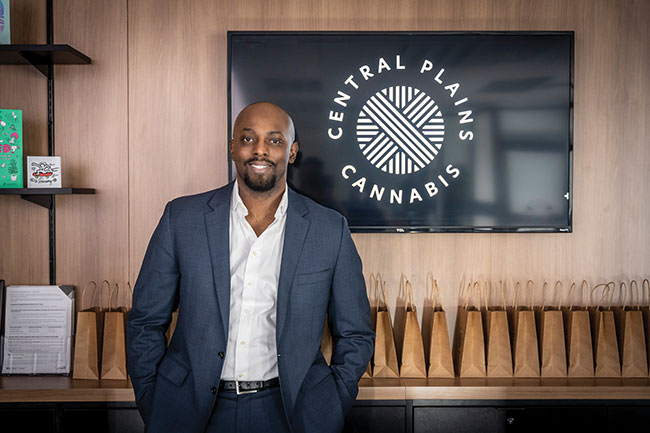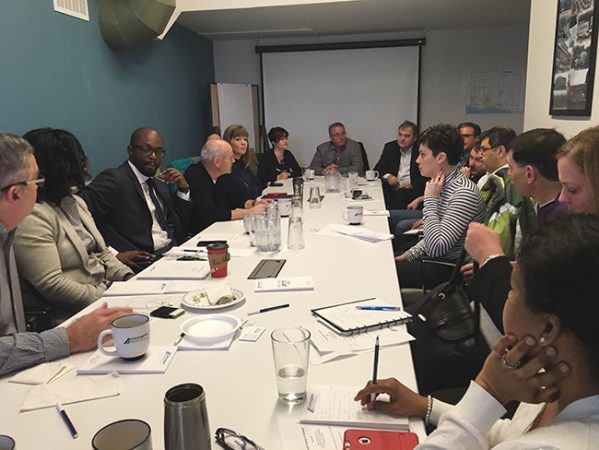
Features
Why building community relationships in Canada’s cannabis market is so important
Coming together to propel the Canadian cannabis industry forward in 2022
April 7, 2022 By Treena Hein
 Central Plains CEO David Duhaney-Walters began meeting with community leaders well before legalization. Photo: central plains cannabis
Central Plains CEO David Duhaney-Walters began meeting with community leaders well before legalization. Photo: central plains cannabis If the Canadian cannabis industry wants to stamp out the illicit market and continue to grow, every cannabis business in Canada needs to make building local relationships a priority.
That’s the view of many in the sector, including George Smitherman, CEO of the Cannabis Council of Canada (C3). “If each and every licensed producer (LP) and retail business puts effort into building local relationships, showing community leaders and the public the importance of local cannabis industry jobs, added taxes to the coffers and other local benefits, there will be a big impact on public perception at the local, provincial and national level,” he says.
“As more community leaders recognize that legal cannabis provides so much economic benefit, support for the industry will increase, remaining stigma will fall away and illegal consumption will drop. All politics is local. Building local political and public goodwill and support should be a strategic priority for every LP and retail business.”
For inspiration and also practical steps each cannabis business can take to engage locally, let’s look at the success of David Duhaney-Walters, CEO and president of Central Plains Cannabis in Clarington, an area in Ontario encompassing communities such as Newcastle and Bowmanville near Toronto.
Duhaney-Walters’ relationship building in the community began well before legalization. He has a deep background in regulatory compliance, having worked with several cannabis firms before starting his own. Central Plains Cannabis opened a physical store in December 2020. The company recently obtained a medical sales licence (with possession) in February 2022.
A journey’s start
Duhaney-Walters first began meeting community leaders and the public through participating in a series of events held by the Clarington Board of Trade (similar to a Chamber of Commerce). One of these events, held in 2018, was a roundtable about building a Centre for Excellence for cannabis, but also focused on future cannabis industry labour needs and other topics.
“There were representatives from many regional cannabis organizations and educational institutions such as Durham College,” Duhaney-Walters explains. “The board has also held other events such as an economic summit in 2019 about building the cannabis industry. I’ve also participated in community initiatives such as ‘Walk a Mile in her Shoes’, and a fundraiser for a local shelter called Bethesda House. At all these events, community leaders got to know me personally and also came to understand my level of knowledge about the industry.”
It was a broad spectrum of influencers that Duhaney-Walters got to know, not just elected representatives at the three levels of government, leaders at the Board of Trade and educational institutions, but also leaders at the fire department, police services, other businesses, non-profits, and so on. And these relationships have had a very positive impact on his business.
“Community leaders were very excited that someone they knew, respected, and trusted was going to open a physical cannabis store,” he says. “I really appreciated that the Mayor of Clarington, Clarington Board of Trade, local councillor, and MPP all were present at the opening in late 2020. You don’t want to be a stranger to any of your local civic leaders. These are the people who will be helping you or not helping you when you need it. And you also want to be included at the table to take advantage of opportunities and gain benefits you don’t want to miss out on. These community leaders want to help those they trust and are working for the improvement of the community as they are, day in, day out.”
But business benefits aside, the relationships Duhaney-Walters has built are also critical at a national scale. “Without personal connections,” he says, “how are we going to be able to communicate about issues and get the support we need at all levels?”
He believes, as Smitherman does, that everyone in Canadian cannabis should be continually educating community leaders about the economic importance of the legal cannabis sector – at the local level and beyond.
“Find out roughly how many jobs the industry provides locally and share that again and again,” Duhaney-Walters says. “At the federal level, we are responsible for 151,000 jobs. And for every $1 million in revenue or capital expenditure, this sector generates $15.1 billion in tax revenues at the federal level and $3 billion on top of that in Ontario. Since legalization, legal cannabis has added $43.5 billion to the federal GDP and $13.5 billion to Ontario’s GDP.”
(Note that the Cannabis Council of Canada is working on more specific statistics for each province and for the various types of economic impact, but some data is available from research firms such as Deloitte and Statista.)
“Keep spreading the good news,” says Duhaney-Walters, “that the Canadian cannabis sector found its footing in a short period of time and is providing a tremendous amount of jobs and other economic benefits. These numbers have a strong impact. They change people’s perceptions about the size and importance of the industry. People are more likely to support something that already matters, that already has power, and to support further benefits that can be gained in terms of government tax coffers and communities.”

Visibility and participation in the local community helps build credibility and support for the cannabis sector. Photo: central plains cannabis
Impact of the store
Duhaney-Walters has also been careful to ensure his store makes an impact in building community respect and support for the cannabis sector.
“We took over the old LCBO location, and people have been surprised and delighted about how we’ve transformed the interior and exterior,” he says. “The store is considered a very positive addition to the community because I’ve made sure it’s very clean, polished, professional, and welcoming. You can see yourself how people’s perceptions change as soon as they walk in the door. They are disarmed right away and their preconceived notions fall away. They are happy to see a new, vibrant and well-managed store in their community.”
While the physical environment of the store is making a positive impact on the community and presenting a positive reflection of the entire industry, so does the outstanding customer service. “I am a trained cannabis sommelier and I am also passionate about the power of plant-based medicine,” says Duhaney-Walters. “I’ve trained my staff so that we are all able to answer questions accurately, with a high level of knowledge. This builds trust in our business and in the whole industry. We work to understand our customers and enable them to get the right products for their needs. We develop personal relationships and know our customers by name. I am extremely excited that now, with our Medical Sales Licence, we will be adding healthcare practitioners on our team and can greatly broaden our scope of service. We also are working to accept donations for a local non-profit at the store. We have to remember the importance of non-profits in our communities and that they need for-profits to support them.”
Duhaney-Walters also plans to continue to attend community events and also organize educational cannabis-related events in the future. He joined the Clarington Board of Trade and is an active member.
Looking at the big picture, he believes that if cannabis businesses fail to engage with the community, there is a real risk that the narrative told about them and the industry as a whole will not be positive – or not as positive as it could be.
“There are a lot of cannabis companies not engaging,” he says. “If we engage, we show that there is more to cannabis than making money and the high. Every other industry engages with the community and we should as well. The financial sector has done a very good job at showing that it’s not just about making profits. There is a large focus with the banks on giving back to the community and people feel that they are making their communities and their country better, through supporting environmental and community causes. We can achieve the same.”
Call to action
Smitherman explains that “as I enter my third year as CEO of the Council and the pandemic is hopefully coming to an end, we’re returning to our core roots of strong national level advocacy. We’re organizing a two-day leadership conference and industry advocacy event at the end of May in Ottawa called ‘Grass on the Hill’ to do more to unite our sector with the key influencers in Ottawa that control our destiny.”
He adds, “we’ve only been able to use Zoom for the last two years, but we’re looking forward to in-person meetings to present our clear objectives for the statutory review process that’s taking place over the next 18 months, things that have worked well and where they can be improved. We’re going to be in Ottawa for concentrated events every spring and every fall.”
However, Smitherman is clear that these efforts will be greatly aided if every single cannabis business leader builds community connections. “We have responsibility for our destiny and that responsibility lies with each company,” he says. “We need to work together to make cannabis a business culture norm. Please spend some of your time and effort on building community relationships. It’s particularly important right now because the circumstances for a lot of cannabis businesses are dire and we also have the statutory review underway. Please look at your schedule and your annual goals and integrate building community relationships.”
Print this page